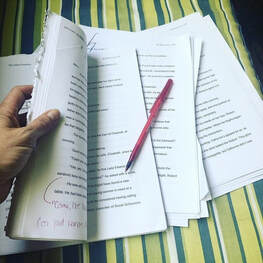|
Why can I write an 80-110,000 word book with (relatively) little pain, but when I have to come up with a title?? I think I'd rather have to edit by candlelight. I like some of my book names. Lord Worthing's Wallflower is a good one because it tells the reader that it's a historical and that the heroine is that ever-popular trope of the overlooked woman. My most recent book, The Daring Mrs. Kent is another favorite title, but not as effective at conveying exactly what the book is. But then there is The Dishonorable Knight. <sigh> I actually love this story and don't know what I was thinking with this title. I mean, our knight hero does defect from Richard III's service and goes and helps the future Henry VII, so technically he "dishonored" his vow to his king. But ... yeah. I wouldn't have made that choice again.
I also have a lot of difficulty coming up with blurbs and hooks (those paragraph and one-line descriptors to tell people what the books is about). HOW can you convey an entire book's meaning in one sentence?? Well, there are professional copywriters who can do just that, but I am certainly not one of them! Well, wait...I just looked up The Scarlet Letter on Amazon and here's the hook: "An 1850 work of fiction in a historical setting, written by Nathaniel Hawthorne and thought to be his best work." Ok, clearly I'm not the only one who has difficulty writing a gripping hook! And oooh, there are lists and lists of the worst book titles ever! Like
Essentially, writing "short" is a completely different skill set than writing a novel and one I need to work on!
0 Comments
 Years ago, I was in a writer’s group with my dad. We all wrote in different genres; I was the only romance writer at the time. I remember hearing a successful author one time bemoan the fact that his mom read one of his books that contained a sex scene. He was embarrassed and awkward about it. Huh, I remember thinking. At least she didn’t have to read it with you in the room, an hour after it came of the printer! There’s nothing like having your dad sitting across the chips and salsa at writer’s group reading your first sex scene. Not only that, this was my first book (which thankfully disappeared in one of my computer upgrades over the years). I’d been a big fan of Judith McNaught at the time who wrote male characters who were “damaged” (i.e., assholes) and female characters who were “pure” and way too understanding. She had a few sex scenes that were…uncomfortable. Needless to say, I followed suit in my characters’ first scene. And MY DAD HAD TO READ IT! GAH! A few years ago, I had a friend start reading my books. She’d never read romance before and she loved them. But she couldn’t get away from the fact that she knew me. Reading sex scenes I’d written made her feel like she was peaking in my diary, apparently. I tried to explain that they weren’t my scenes. Yes, I wrote them, but I certainly didn’t replicate experiences from my own life. It’s sometimes hard to explain to a non-writer how these people (characters) live in your head and you try to massage their story, but ultimately (at least for me), their experiences are entirely theirs. I don’t feel like I create the characters so much as I discover them. As I write their story, if I’m doing a good job, they begin to trust me and share more about themselves. I know that sounds like I’m channeling the dead or something equally paranormal, but it’s the only way I can explain it. It’s the only thing that explains to me how something that I wrote in chapter three with no plan for that something to become a major plot point suddenly turns up in chapter eighteen with major significance. Yes, I plan my story, the timeline, the progression of conflicts and challenges, the character arcs, but only loosely. It’s the characters who ultimately flesh it out and make it real. I just get to put the words on paper. So, if you know the person who wrote that spicy scene you’ve reread three times, don’t worry that you’re some sort of voyeur. Chances are, the writer was just as surprised by the turn of events as you!  You write for weeks, months even. Dragging words out of a brain loathe to give them up, crafting a plot and characters, finally bringing all the various threads of the story together in a satisfying resolution. Finished! your baby has been born and it is perfect. It is just as it should be and the world is surely looking to read its magnificence. Except you have twenty instances of passive voice. And waaaay too many dialogues in the second half of the book but the first half you can't tell who's talking because there are too few. And where did that secondary character go? They dropped off the page in chapter thirteen. But weren't they crucial to the finale? Let's not even get into how cheesy that flirtation scene between the two main characters was.... Years ago, I was a technical editor. I would try to make technical information written by engineers and physicists comprehensible to the rest of us. At one lab, the tech experts were so grateful for my assistance. They were amazed at how I'd taken their random thoughts and synthesized them into a cohesive document. An another lab...The documents were fine just as they were, thank you very much. I'm not sure they ever incorporated any of my edits into the final product. Sheesh, what egos, I remember thinking. Over the course of writing my last six novels, I fell into a rhythm a pattern that was |
AuthorGreat, all I need is one more reason to procrastinate! As if Instagram wasn't enough... Archives
March 2022
Categories |
© COPYRIGHT 2015. ALL RIGHTS RESERVED.


 RSS Feed
RSS Feed
